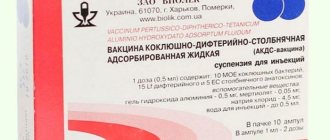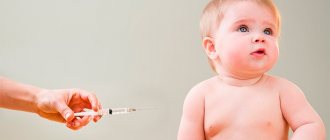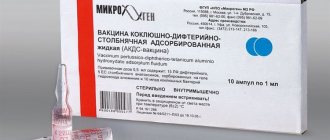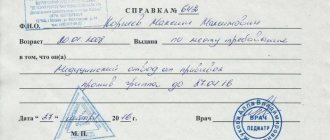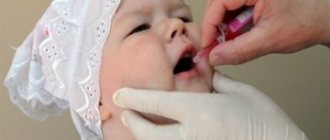(Another useful site - experts on vaccinations)
If for some reason your child has not been vaccinated in accordance with the vaccination schedule, then most likely his body is not sufficiently protected from dangerous infections and continued immunization may be required.
missed hepatitis B vaccination
BCG vaccination schedule was violated
missed the DPT vaccine
Missed polio vaccination dates
missed vaccination against measles, rubella or mumps
If for some reason your child has not been vaccinated in accordance with the vaccination schedule, then most likely his body is not sufficiently protected from dangerous infections and continued immunization may be required. However, each vaccine differs in its antigenic composition, the intensity of the reactions it causes in the body and the duration of action. Therefore, the question of what the further timing of vaccination is is always decided individually, taking into account the state of the child’s immune system, the diseases he has suffered and the type of vaccines. As a guide for constructing a further vaccination schedule, the following general recommendations can be given, which consider violations of vaccination deadlines separately for each category of vaccines.
Hepatitis B
·If the first vaccination against hepatitis B is missed, that is, it was not performed in the first 12 hours after the birth of the baby, then you can start vaccination on any subsequent day and then follow the standard schedule - the second vaccination is given a month later, and the third after another 5 months.
·If you missed the hepatitis B vaccination, which is performed, according to the vaccination calendar, a month after birth, then it can be performed a maximum of 4 months after the first one. Moreover, the shorter the interval, the more reliable immunity will be formed. If more than 4 months have passed since the first vaccination, then the administration of vaccines is usually continued as if the vaccination schedule had not been disrupted, but in this case there is a high chance of insufficient immunization. If the doctor doubts the effectiveness of further vaccination, then it may be necessary to determine antibodies to the hepatitis B virus in the child’s blood, with a mandatory quantitative study.
·If you miss the third hepatitis B vaccination, you do not have to worry about a decrease in the effectiveness of vaccination for 18 months after the first vaccination. This is the maximum period of time after which an analysis for the concentration of antibodies against hepatitis B will most likely be required to complete the course. In some cases, when sufficient immunity has not been formed even after completing the course of vaccination, additional vaccination may be required.
BCG
·If the timing of BCG vaccination is violated, then the tuberculosis vaccination is given in the fourth month of life. Before vaccination, a Mantoux test must be performed and vaccination is carried out only if a negative result is obtained. A positive test may mean that the child has already encountered the tuberculosis pathogen and may be infected. This is an indication for further, more detailed examination. The timing of the vaccination is due to the fact that during the first 3 months of life, immunity has not yet been formed enough to give an adequate response to the introduction of tuberculin, which is used in the Mantoux test, and the reaction may be false negative. If you have not yet been vaccinated, but it is known that the child has been in contact with a patient with tuberculosis or a carrier of Koch's bacillus, then low doses of anti-tuberculosis drugs are prescribed and, after completing the course of preventive treatment, the Mantoux reaction is examined. If the test is positive, treatment is continued, and if the test is negative, vaccination is performed, followed by isolation of the child for a week. For normal formation of post-vaccination immunity, at least a month must pass between the BCG vaccination and other vaccinations.
DTP
·If you missed the DTP vaccination, which according to the vaccination calendar is performed at 3 months, then you can start the vaccination course at any time before the age of 4 years. After 4 years of age, the administration of domestically produced vaccines with a pertussis component is not allowed, but the French analogue Tetracoc (with an anti-poliomyelitis component in the composition) can be used. From 4 to 6 years of age, vaccination is done with the ADS vaccine, and after reaching 6 years of age, ADS-M is used. These are vaccines without pertussis components, the latter contains reduced dosages. If a child has had whooping cough, and you have not yet received a single DPT vaccination, then vaccination with DPT toxoid is carried out (two vaccinations with a month's interval and one revaccination after a year).
· Violation of the timing of vaccination of the second DTP vaccination does not entail a repetition of the entire cycle - the administration of vaccines continues as if the schedule had not been lost, maintaining an interval between vaccinations of 30 days. If by this time the child has had whooping cough, then he is no longer given DTP vaccinations; instead, ADS is used, and after 9-12 months the ADS is repeated
·If the third DPT vaccination is missed, it is performed regardless of the omission. If a child who has already been vaccinated twice with DTP has had whooping cough, the course of vaccination is not continued and is considered completed. Revaccination is carried out with ADS, after 9-12 months. As already mentioned, from the age of 4, vaccines without a pertussis component are administered. In order to have time to fully vaccinate a child against whooping cough, sometimes it makes sense to perform the first DPT revaccination, maintaining only the minimum permissible interval - 6 months.
Polio
·If the first polio vaccination is missed, children under 6 years of age are vaccinated twice, with an interval of 30 days. For children over 6 years of age, the vaccine is administered once.
·If the second polio vaccination is missed, vaccination is not started again, but continued, despite the extended interval. The current vaccination calendar is built taking into account the use of OPV (live polio vaccine), but it is acceptable to replace it with IPV (an inactivated vaccine, more effective).
·If the third or fourth vaccination against polio is missed, then the tactics are the same as if you missed the second vaccination. It is important that before reaching 2 years of age the child is vaccinated 5 times with OPV or 4 times with IPV. When using vaccines together, the total number of vaccinations should not be less than 4.
Measles, rubella, mumps
·If your vaccination schedule has been thrown off track and you have missed your first measles, rubella or mumps vaccination, it is best to get it as soon as possible. According to the vaccination calendar, vaccination against these infections is carried out simultaneously, in different parts of the child’s body, with separate syringes or by using combined vaccines containing components against several infections. It is recommended to resort to separate administration of vaccines if the child has already had any of the listed infections, against which the creation of specific immunity is no longer required. Even if the timing of vaccinations has been significantly shifted, subsequent revaccination is carried out at the age indicated in the national vaccination calendar.
·If revaccination against measles, rubella or mumps is missed, the vaccine is given at any appropriate time, trying to create immunity before the child enters school. If for some reason vaccinations against rubella, mumps and measles are performed in the form of single-component mono-vaccines, then the recommended interval between their administration should not be less than a month. Otherwise, there is a risk that the second vaccine will be inactivated by immune cells produced in response to the first vaccine.
·If vaccination against rubella, which is given to girls during adolescence, is missed, it is done as soon as health conditions allow. The vaccine can be done at any age unless pregnancy is excluded.
How to properly prepare a child for vaccinations against diphtheria, hepatitis, rubella, polio and other childhood diseases? Get acquainted with the vaccination calendar and find out where it is best to get vaccinated. Consulting pediatrician Olga Minkina.
Hepatitis B
In the vaccination calendar, the hepatitis B vaccine comes first: it is given to the child during the first day in the maternity hospital. Hepatitis B is an infectious disease that causes severe liver damage. The second vaccination is carried out at 3 months, the third at 6 months.
Is it worth vaccinating your baby right in the maternity hospital?
Doctors have differing opinions on this matter. Many people believe that it is not advisable to vaccinate in the first hours of life, since the newborn still has a very poor immune response and vaccination may turn out to be pointless - the child will not develop immunity against hepatitis B.
· It is more reasonable to postpone the first vaccination to a later time, for example, you can do it at 3 months, then vaccination will be carried out according to the scheme: 3-6-9 months.
·Children are vaccinated according to a special scheme if their mothers are carriers of hepatitis B or there are people in the family suffering from this disease. Babies must be vaccinated in the first 12 hours after birth, the second vaccination is carried out at the age of 1 month, the third at 6 months, and the fourth at 12 months.
· The vaccination is done intramuscularly in the anterior lateral part of the thigh, and after 3 years - in the shoulder.
·Vaccination is usually tolerated quite easily by the child. In some cases, there may be a slight rise in temperature, thickening, and redness at the injection site. No special preparation is required for vaccination.
·For hepatitis B there are single vaccines (Combiotech, Euvax B, Engerix B, etc.) and combined ones (for several diseases).
It is advisable that intramuscular administration of vaccines to young children should be carried out in the anterior lateral part of the thigh. When the vaccine is administered into the buttock, complications often occur (there is a risk of getting into the subcutaneous fat, which leads to swelling); the nerve trunk can be damaged, and there is a smaller immune response. For older children, injections are given in the upper third of the shoulder.
DTP vaccination: how to prepare a child
Absolutely all parents should clearly know how to prepare their child for DTP vaccination.
The first vaccination is carried out at the age of three months, a delay is possible in cases where the child is sick with viral or infectious diseases, as well as when the therapist has identified the presence of other pathologies. The second vaccination is given at 4.5 months, and the third at six months.
First of all, the pediatrician sends the baby for general tests before the DTP vaccination. This procedure allows you to identify all sorts of deviations in the child’s condition and detect the progression of diseases for which vaccination is not allowed. The doctor also needs to pay special attention to the results of a blood test before DTP vaccination: the hemoglobin level should not be lower than 80 and the number of leukocytes should be normal. Otherwise, the administration of the immunological drug is postponed for some time until the indicators return to normal.
In order to fully verify the possibility of vaccination with DTP, the child must be examined by a neurologist, and he must also undergo an ultrasound examination of the brain. If no deviations are found, then you can proceed with preventive vaccination without fear.
A week before vaccination, it is recommended not to introduce new foods and medications into the child’s diet. It is better to feed your baby proven, anti-allergenic, fresh cereals, mixtures, fruits and vegetables (depending on age).
Before vaccination with DTP, it is also necessary to ensure that the child is not exposed to excessively low or high temperatures.
To improve the functioning of the immune system and prevent unpleasant side effects, a medical specialist prescribes pharmacological medications.
Tuberculosis
A child is vaccinated against tuberculosis in the maternity hospital in the first 3-7 days. Contraindications to vaccination are low body weight (less than 2000 g), intrauterine infection, hemolytic disease of the newborn, purulent-septic diseases, severe damage to the central nervous system.
·If the child was denied vaccination in the maternity hospital, it can be done later (preferably before 6 months). Please note that if you are going to vaccinate a child older than 2 months, you will first need to do a Mantoux test. This is necessary to find out whether the child is infected with the tuberculosis bacillus - then vaccination will be contraindicated for him.
·Vaccinations against tuberculosis are given only in a medical facility; Doctors visiting homes do not have the right to vaccinate children against this disease.
·Vaccination against tuberculosis is always carried out separately from other vaccinations.
·Every year, a child is given a Mantoux test to determine whether he is infected with tuberculosis. If the baby was vaccinated already in the maternity hospital, then the Mantoux test is given to him for the first time at 1 year.
· The vaccination is given to children intradermally - in the area of the left shoulder, at an older age - under the shoulder blade.
·Two vaccines are used against tuberculosis - BCG and BCG-M (light version).
· Revaccination is carried out at 7 years of age.
Polio
For a long time, children in our country were vaccinated with a “live” oral vaccine (OPV) - it was dripped into the mouth. Unfortunately, because of this, there have been cases (albeit very rare) of vaccine-associated polio, when the disease itself developed due to the vaccine, leading to disability.
· Currently, they are trying to move away from the use of “live” vaccines, and instead use an inactivated vaccine (IPV) - it contains “killed” viruses and is not capable of causing disease. The inactivated vaccine is administered intramuscularly.
·After using a “live” oral vaccine, a child sometimes experiences stool upset for 1-2 days, and in some cases there is an increase in temperature. The inactivated polio vaccine usually does not cause such reactions.
· The polio vaccine is given at 3 months, then at 4.5 and 6 months. Revaccination is carried out at 18 and 20 months.
·The inactivated polio vaccine used in Russia is Imovax Polio. In addition, the combined Pentaxim vaccine is used (protection against polio, whooping cough, diphtheria, tetanus and Haemophilus influenzae type b).
Diphtheria, whooping cough, tetanus
For these diseases, combination vaccines are mainly used (that is, those that protect against several diseases at once). The first vaccination is given at 3 months, the second at 4.5 months, and the third at 6 months; revaccination - at 18 months. The vaccine is administered intramuscularly into the anterior lateral thigh or buttock. This vaccination is not always easily tolerated by the child and requires prior preparation. The heaviest component of the vaccine is the pertussis component. After vaccination, local and general reactions are possible. Local symptoms include redness and swelling at the injection site; general symptoms include malaise, fever, and in rare cases, convulsions. The reaction after the second and subsequent vaccinations is often stronger than after the first.
· Recently, vaccines have appeared that give fewer post-vaccination reactions. Good tolerability is explained by the fact that they contain an acellular pertussis component. These vaccines are foreign-made and are offered in paid medical centers.
· Before vaccinating your child against whooping cough, diphtheria and tetanus, it is advisable to prepare him: for 1-3 days before vaccination, the baby is prescribed antihistamines in age-appropriate dosages. The question of whether to give a child antihistamines on the day of vaccination and after it is decided by the pediatrician individually in each case.
·After vaccination, children may develop a fever. This usually happens 6-8 hours after vaccination; high temperature can last up to 2 days.
· Therefore, you must have antipyretic drugs at home (preferably in the form of rectal suppositories) so that you can use them if necessary.
·If after the first administration of the vaccine there was a rise in temperature to 38.5 °C or higher, then this is a contraindication to repeated vaccination with a pertussis component. Repeated vaccinations are made with vaccines without a pertussis component or containing an acellular pertussis component.
·Vaccines that protect against these diseases are DPT, ADS (without pertussis component), Infantrix, Pentaxim.
Vaccination and antibiotics
If in the past there was no debate about the need for vaccinations, then in modern society parents think about the benefits of vaccinations for their children. The consequences of some types of injections frighten parents with dangerous side effects, the counteraction of which requires the prescription of antibiotics. The question that becomes relevant is how taking antibiotics after vaccination will affect the formation of the immune defense that the vaccination should form.
Doctors are convinced that if all the rules of conduct before and after vaccination are followed, it will not harm even newborns. After all, the result of compulsory vaccination prevention of the past was the absence today of formidable epidemics that claim lives.
Is it possible to take antibiotics after vaccination?
The DPT vaccine is considered the most dangerous in terms of adverse reactions in children. Once in the body, the medicine leads to a weakening of its own protective properties. The cause of a child’s severe reaction to vaccination is the toxoids it contains (diphtheria, tetanus), as well as fragments of killed pertussis microbes.
Side effects include such a serious reaction as the appearance of a lump at the site of vaccine administration. The development of purulent inflammation is accompanied by an increase in temperature and soreness, which is a consequence of infection during the injection. In this case, to protect against dangerous symptoms of complications, the doctor prescribes a course of antibiotics after DPT vaccination.
Flu vaccination
WHO experts strongly recommend getting vaccinated against influenza annually before the start of the epidemic season. Vaccination not only saves vaccinated people from deadly complications after the flu, but also prevents the massive spread of the virus. However, immunization will not become effective without taking preventive measures, including wearing a gauze bandage during the formation of immunity after the injection.
Often, after visiting crowded places, a person who has received the vaccine develops symptoms of the disease that can be confused with the flu. However, the cause of the disease is not the vaccine, but another disease that requires treatment with antibiotics after vaccination.
The opinion of doctors is clear - the doctor should make a decision on prescribing antibacterial drugs. The therapy does not affect the formation of the immune response and does not require repeated vaccination.
Why do complications develop after vaccinations?
The development of adverse reactions requiring the prescription of antibiotics is not at all associated with the poor quality of the vaccinating drug. An unpleasant situation is a consequence of non-compliance with immunization rules. Any vaccination should only be given to a healthy person, excluding contact with sick people.
For you: Allergic autoimmune diseases and features of their development
Symptoms of an acute disease or exacerbation of a chronic process can lead not only to the lack of results from vaccine prevention. For example, after foreign agents enter the body with DPT vaccination, children's immunity is temporarily weakened, which increases the risk of developing a concomitant infection. In this case, the child may need antibiotics to treat the complication.
Measles, rubella, mumps
·Children are vaccinated against these diseases at 12 months and 6 years. Combination vaccines against three diseases, two-component and mono-vaccines are used. There are vaccines of both domestic and foreign production.
· Since the vaccine against these diseases is “live”, after its administration the child may experience some reactions, for example, an increase in body temperature, swelling of the lymph nodes, the appearance of a rash, a slight cough and runny nose - that is, the child seems to have suffered from these diseases in a very mild form. Typically reactions occur on days 1-2, 5-8 and 10-12.
To make it easier for your baby to tolerate vaccination, it is advisable to give him antihistamines 1-3 days before vaccination and several days after it. The pediatrician will calculate how long to give the drugs after vaccination and in what dose. Also, do not forget to stock up on antipyretic medications so that your baby’s fever does not take you by surprise.
·Combined vaccines against measles, rubella and mumps - Priorix, Trimovax and others.
How parents should behave on the day of DPT vaccination
To the question of how parents should behave on the day of vaccination with DTP, experienced specialists have a lot of answers. First of all, mother and father must remember that they themselves should not be afraid or worry on the day of vaccination - the psycho-emotional state of the parents, including anxiety and panic, is transmitted to the child.
As a rule, qualified doctors recommend vaccinations on an empty stomach - a few hours before administering the drug (3-5) try to limit the child from eating any food. To delay the feeling of hunger, increase the amount of fluid you take.
Immediately before the injection, parents should ensure that the pediatrician examines the baby (measures body temperature, checks the throat and condition of the skin) - on this day the children should be completely healthy.
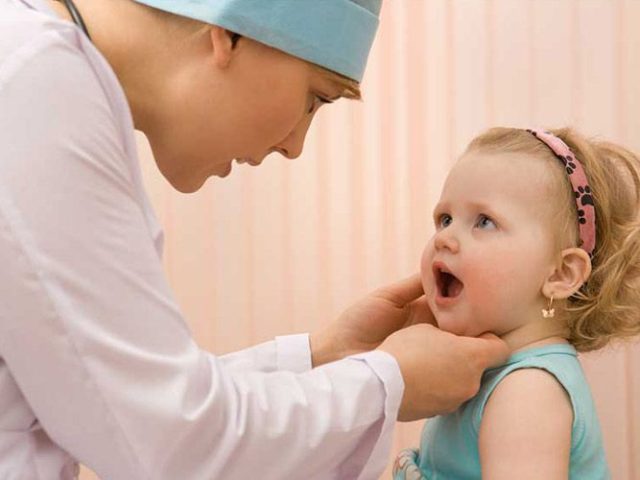
After vaccination, parents should also ensure that the child is not exposed to low or high temperatures and feels well. If there is a strong increase in temperature, give an antipyretic drug, for example, Ibuprofen, Paracetamol, etc. If your baby has an allergic reaction, use antihistamines. It is recommended to coordinate the dosage and drug used with your doctor.
If side effects do not disappear even after taking medications, call an ambulance immediately.
Other diseases
There are a number of vaccinations that are not included in the Russian national vaccination calendar, but, nevertheless, they can be done to protect the child from serious diseases. By the way, in European countries and the USA these vaccinations are included in the mandatory vaccination plan.
In our country, you will have to do them at your own expense.
· Haemophilus influenzae type b infection (Hib infection) often causes pneumonia, otitis media, meningitis and other diseases in children. It poses the greatest danger to children from 6 months to 2 years. The Haemophilus influenzae vaccine can be given at the same time as the diphtheria, whooping cough and tetanus vaccination. Three vaccinations will be required with an interval of 1-1.5 months and one revaccination, which is carried out a year after the third vaccination. If the vaccination is given to a child older than 6 months, then two vaccinations and one revaccination will be enough for him.
·Vaccine against hemophilus influenzae infection - “Act-HIB”. In addition, you can protect yourself from this disease using the Pentaxim combination vaccine.
·After 2 years of age, a child can optionally be vaccinated against pneumococcal infection that causes pneumonia (Pneumo 23), meningitis (Meningo), and chickenpox (Varilrix). In childhood, chickenpox is usually tolerated quite easily by children, but in adolescence it can be severe and cause complications.
·In addition, you can vaccinate your child against hepatitis A. Vaccination is carried out twice, the second time - 6-12 months after the first. Usually the vaccination is tolerated quite easily. Swelling and swelling at the injection site are possible. For hepatitis A, the vaccines “Havrix”, “https://www.baby.ru/pharmacy/40606-avaxim”, “Vakta” are used. There are also combined vaccines against hepatitis A and B.
Vaccination rules
·Vaccination cannot be done if the child is sick. Vaccination can be carried out 2-4 weeks after the baby has recovered.
· The interval between vaccinations must be at least a month.
·Vaccination in hot weather is undesirable.
· It is better to refrain from visiting public places with your baby before vaccination and after the administration of live vaccines.
·Before and after vaccination, it is not recommended to introduce new complementary foods to the child.
·You should not stop breastfeeding during the vaccination period.
·Members of the child’s family must be healthy at the time of vaccination.
· It is not recommended to bathe the baby in the evening on the day of vaccination.
·Parents have the right to refuse to vaccinate their child (based on the Federal Law “On Immunoprevention of Infectious Diseases” dated September 17, 1998 No. 157-FZ), but they must understand that they are responsible for the health of their child.
The body's reaction after the second and subsequent vaccinations is often stronger than after the first vaccination.
A second vaccination is not given if, after the first one, the child has the following reactions:
· shrill cry of the baby, which lasted for 3 hours or more;
·increase in the child’s body temperature to 38.5 °C and above;
· the occurrence of a strong local reaction to vaccination (redness, swelling and swelling with a diameter of more than 5 cm at the injection site).
Antibiotics before and after vaccination
Expert's point of view
In a series of video programs, famous pediatrician Evgeniy Komarovsky expressed his opinion on antibiotics and vaccination:
- The use of antibiotics does not affect the indications for vaccination;
- vaccinating drugs do not prevent the body from forming immunity;
- After a course of antibiotics, vaccination can be done if there are no contraindications.
The doctor clarifies that under certain circumstances, antibiotic therapy cannot be considered an obstacle to vaccinating a child. Indeed, for some diseases, children are prescribed long-term therapy with antibacterial agents, which should not cause a delay in immunization.
Antibiotics before vaccination
The childhood vaccination schedule is often disrupted due to the child's illness. For example, if a baby is diagnosed with otitis media, it is important to cure the disease before vaccination. Treatment of the disease includes the prescription of antibiotics. Therefore, parents have a question about how many days later they can go for vaccination. Vaccination is allowed at least two weeks after completion of the antibacterial course. In addition, you will have to undergo tests, based on the results of which the doctor gives permission for vaccination.
If the disease overtakes the baby after immunization, antibiotic therapy will not interfere with the production of antibodies. Modern vaccines for children do not contain live pathogens that could be affected by an antibacterial drug.
To get vaccinated after a mild cold or sore throat, even a common runny nose, you will have to wait 2-3 weeks. The body, weakened by the disease, must be allowed to get stronger by controlling body temperature. The situation is different after serious illnesses, such as rubella or chickenpox, the treatment of which includes taking antibiotics.
The attending physician will answer the question whether and when it is possible to start vaccination. Usually, vaccination is allowed only after recovery, but not earlier than after 2 months. The body needs time to restore friendly microflora, which is destroyed by antibacterial drugs.
Antibiotics after vaccination
There are situations when an adult, after receiving a vaccine, learns about the need to treat an inflammatory disease with antibiotics. Patients are interested in whether it is possible to take the prescribed drug after vaccination. Doctors say that medications do not interfere with each other:
- the process of action of the vaccine will end with the appearance of its own immunocomplexes (antibodies) in the blood;
- treatment of inflammation with antibiotics will be successful if the body responded normally to the vaccine.
There is no need to worry that you had to take an antibiotic after vaccination. If it is needed to treat another disease, there is no need to worry about its negative impact on the formation of immunity. It is important that the attending physician is informed about the fact of vaccination.
Routine and seasonal vaccination allows you to protect the body of a person of any age from many dangerous diseases. The procedure saves humanity from the development of pandemics that are deadly for the population, despite some unpleasant consequences of individual vaccinations.
For you: The most beneficial food for immunity
Where to get vaccinated?
·In district clinics Vaccination in district clinics in accordance with the National Vaccination Calendar is carried out free of charge. Before vaccination, the child is examined by a doctor. Information about vaccinations given is entered into the child’s card, which is stored in the clinic. The disadvantages of this option include the fact that before vaccination, you and your child may have to sit in line for a long time, and that the pediatrician has too little time to properly examine your baby. In addition, local clinics often offer not the best vaccines.
·In medical centers Here you can find better modern vaccines. The cost of vaccination will consist of the cost of a doctor’s examination (200-1200 rubles) and the cost of the vaccine itself (100-2000 rubles). If you want to contact a paid center, then carefully consider its choice - it is advisable that the medical center has a good reputation and its doctors have been involved in vaccination prevention for a long time. Information about the vaccination done must be documented - for this it is advisable to have a vaccination certificate with you (a booklet in which all information about the vaccinations given is entered).
·At home Vaccinations at home can only be done by doctors who specialize in vaccine prevention. For a child, this is the most gentle option - the baby will not have additional stress in the form of a visit to the clinic. However, it must be taken into account that vaccines must be stored under strictly designated temperature conditions. And these conditions must be observed even during transportation, otherwise the vaccine may deteriorate. Therefore, vaccination at home can be carried out only if you completely trust the doctor who will do it or the medical center in which he works. Make sure that information about vaccination is included in the vaccination certificate.
Russian national vaccination calendar
Newborns (in the first 24 hours of life) First vaccination against viral hepatitis B Newborns (3-7 days) Vaccination against tuberculosis 3 months Second vaccination against viral hepatitis B, first vaccination against whooping cough, diphtheria, tetanus, polio 4.5 months Second vaccination against whooping cough, diphtheria, tetanus, polio 6 months Third vaccination against whooping cough, diphtheria, tetanus, polio, third vaccination against viral hepatitis B 12 months Measles, rubella, mumps 18 months First revaccination - diphtheria, whooping cough, tetanus, first revaccination - polio 20 months Second revaccination - polio 6 years Revaccination - measles, rubella, mumps 7 years Revaccination against tuberculosis, second revaccination - diphtheria, tetanus 13 years Viral hepatitis B (previously unvaccinated), rubella (previously unvaccinated girls or those who received only one vaccination) 14 years Third revaccination - diphtheria , tetanus; third revaccination - polio; revaccination - tuberculosis (if you were not vaccinated at 7 years old)
